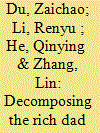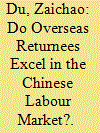| Srl | Item |
| 1 |
ID:
136276


|
|
|
|
|
| Summary/Abstract |
In this paper we evaluate the relative importance of the two main channels, namely the composition effect and the income structure effect, through which the paternal income affects children's income inequality. Using data on 2677 pairs of father and children from China Health and Nutrition Survey (CHNS), we construct the counterfactual income of children from poor families if they had the same characteristics as children from rich families. We propose an instrumental variable quantile regression-based method to solve the endogeneity problem and decompose the rich dad effect on income inequality into the composition effect and the income structure effect. We find that the composition effect explains at least 80% of the income difference at any quantile, and it explains all the income difference at the top four deciles. Income structure effect has a significant impact only at quantiles between 20% and 40%, where it explains about 20% of the income difference
|
|
|
|
|
|
|
|
|
|
|
|
|
|
|
|
| 2 |
ID:
181145


|
|
|
|
|
| Summary/Abstract |
Overseas study is a global phenomenon and a major business internationally. But does overseas study pay off? Using data from the 2015 China Household Finance Survey (CHFS), we examine the labour market performance of overseas returnees in China. To obtain more accurate results, we matched each returnee with a local so that the domestic group is as similar as possible to the returnee group. We then conducted empirical analyses of the matched data. We find that compared with domestic postgraduates, returnee postgraduates earn about 20 per cent more annually. Moreover, the salary premiums paid for foreign graduate degrees can be attributed principally to the superior human capital gained from overseas education rather than from any “signalling” effect. Also, returnees with graduate degrees are more likely to enter high-income professions and foreign-funded ventures, and to reach higher positions in those organizations. However, we find no significant differences in income, occupation choices and positions between returnee and local bachelor's degree recipients. As such, we suggest that Chinese students and their families are best served when the students obtain a local undergraduate degree and then go overseas for graduate training.
|
|
|
|
|
|
|
|
|
|
|
|
|
|
|
|